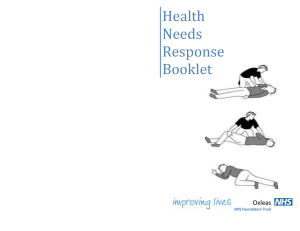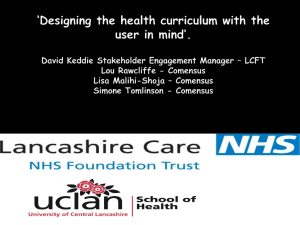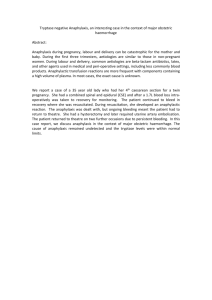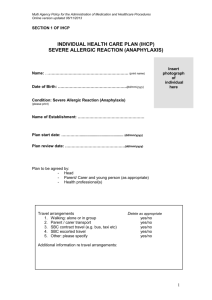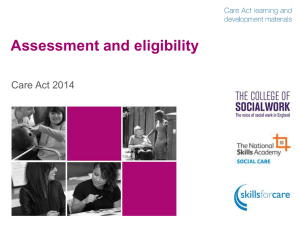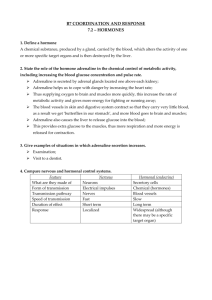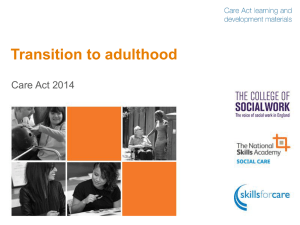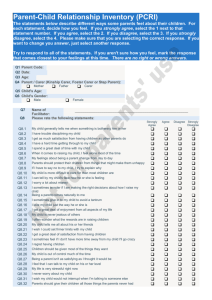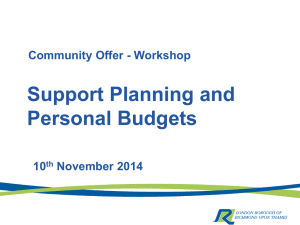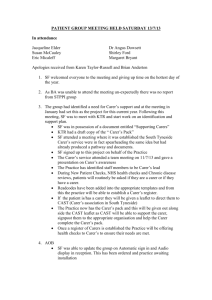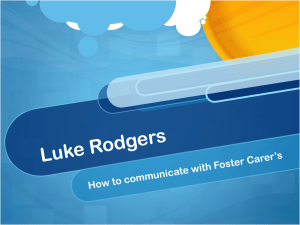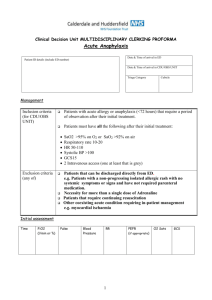Health Needs Response Booklet
advertisement
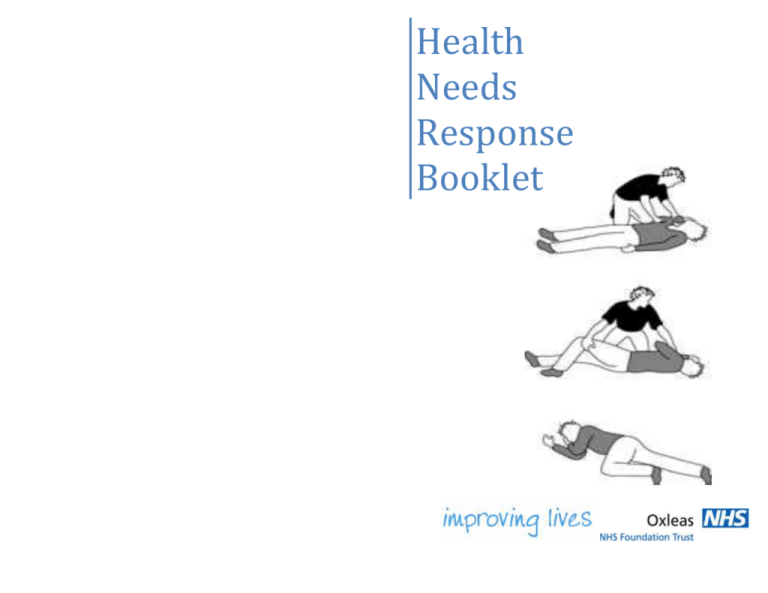
Health Needs Response Booklet Your Paediatric First Aiders are: First Aid at Work : Your school nurse is You can contact her on E-mail Address Parent Responsibilities: Inform the school or school nurse of changes in the Child’s Health or Treatment. Supply the school with medical letters & medication within date and with a prescription label (Child’s name, amount of medication and method of administration). School Responsibilities: Annual training for identified staff. Inform School nursing services of Child’s health needs or changes. Update Booklet when informed of child’s health needs or changes. Follow protocol for storage of medications on school site and during events off site. Ensure staff aware of and have access to Booklet School Nursing Service: Facilitate production of Booklet Liaise with parents and schools Review of medical information with parents and child as required. Provide annual training for schools Children with Asthma ANAPHYLAXIS Mild to Moderate Reaction Hives & Flushes ACTION Stay with child & CALL for help GIVE ANTI HISTAMINE AS Per PROTOCOL from consultant Contact parent/carer SEVERE ALLERGIC REACTION Swelling of face or lips Abdominal pain Nausea, vomiting Difficulty / noisy breathing swollen tongue tightnessauto of throat GiveSwelling ADRENALINE injector Difficultyimmediately talking / hoarse voice (as prescribed for that individual) If difficulty in breathing SIT. Give ADRENALINE auto injector If collapsed raise legs, IMMEDIATELY DO NOT STAND If difficulty SIT DIALbreathing 999 state ANAPHYLAXIS If collapsed raise legs If no improvement in 5 minutes give DO NOT STAND Second Adrenaline Dial 999 state ANAPHYLAXIS If no improvement in 5 minutes give SECOND ADRENALINE Watch for signs of anaphylaxis Anaphylaxis Campaign ASTHMA Children with Allergies/Anaphylaxis Symptoms Coughing Shortness of breath Wheezing Feeling tight in the chest Being unusually quiet Difficulty speaking in full sentences Tummy ache (sometimes in younger children) Give reliever (BLUE) Inhaler Repeat up to 4 puffs (use spacer if prescribed) Reassure child / adult to remain with child SYMPTOMS RELIEVED Yes Return to school activities Parent/Carer informed No Child/young person too breathless to talk Lips blue Distressed, gasping, struggling for breath Unable to use inhaler Decreased level of consciousness CALL 999 If possible give reliever inhaler 1 puff/minute for 10 minutes Encourage to sit upright / lean forward Loosen clothing Contact parents/carers Asthma UK Children with Sickle Cell SEIZURE MANAGEMENT Focal Absences Repetitive Movements Unresponsive Tonic / Clonic Jerking & Rigidity Unconscious Incontinence Atonic Sudden drop Maintain safe environment Ensure safe position to prevent injury If vomiting/ excessive saliva place head to side Stay with child & observe Inform Parent/ Carer If 1st Seizure or showing signs of distress i.e breathing problems. CALL 999 Inform Parent/ Carer Seizure lasts longer than 5 minutes YES Any concerns call 999 If prescribed Administer Buccal Midazalom as per protocol As seizure stops put on side or into recovery position Children with Seizures SICKLE CELL Daily Considerations Access to water Child kept warm and dry Participation in PE determined by temperature extremes, individual tolerance and pain If tired allow rest Frequent Access to toilet Guide for mild to moderate Pain / Tiredness Urgent Medical Response required if: Pain relief if prescribed Breathless Rest and fluids Chest Pain Keep child warm & comfortable Abdominal pain Drowsy Inform parent / carer Severe headache Call 999 Inform parents Children with Diabetes Treatment for Hypoglycaemia (Low Blood Sugar) WATCH FOR: Hunger Trembling/ shakiness Sweating Anxiety irritability Mood change Aggression Lack of concentration Vagueness Drowsiness Pallor Glazed eyes DO NOT MOVE CHILD BRING TREATMENT TO THEM *ACTION if CONSCIOUS Immediately GIVE SOMETHING SUGARY (child should have emergency snack pack) Lucozade, coke or non diet drink Glucose tablets Fruit juice Or Glucogel If UNCONSCIOUS Do not give anything to eat/drink Remain with child Place in recovery position CALL 999 Inform parent/carer Give longer acting carbohydrate Meal if due Portion of fruit, sandwich, biscuits, cereal bar Blood glucose > 4mmol Inform Parent/Carer for further action Check blood glucose after 15 minutes If Conscious REPEAT ACTION from BOX IMMEDIATELY GIVE SOMETHING SUGARY Blood glucose less than 4mmol *
